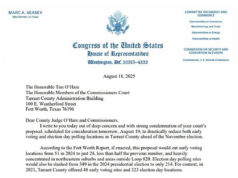Already overloaded criminal courts across the country have come to a near standstill as a precaution against spreading COVID-19. The backlog means innocent men and women will have to wait years to fight their charges and break the yolk of probation and pretrial charges that can easily drain hundreds of dollars per month from the pockets of America’s poor. In Harris County alone, the backlog reached nearly 50,000 defendants in November.
A thread of 2020 emails from the Tarrant County District Attorney’s office shows how quickly the possibility of early release can be dashed.
A June email titled “Review for Early Release” describes a middle-aged male who allegedly burglarized a home several years ago. Sentenced to more than 100 months of supervised probation, the alleged perpetrator had paid his fines in full, completed 240 hours of community service, reported as directed “without issue,” completed a Project Safe Neighborhood program, and scored a “low” risk of recidivism, according to the DA. The DA document went on to note that the victim of the burglary was in support of early release for the alleged perpetrator.
“I don’t think he should be on probation to begin with,” one assistant district attorney replied, meaning that she believed the compliant defendant should be incarcerated. “I object to early termination.”
As with most of the country, the number of criminal cases accepted by the local DA’s office has swelled over the past decades: 1960 (3), 1970 (549), 1980 (15,516), 1990 (33,659), 2000 (36,766), 2010 (39,637), and 2019 (48,945), according to the county. That final figure means that roughly the combined populations of Benbrook, Crowley, and White Settlement face new criminal charges every year in Tarrant County alone. The American criminal justice system holds around 2.3 million people in jails and prisons, according to the nonpartisan think tank Prison Policy Initiative. One TCU professor recently told us that American’s obsession with jailing the poor is largely the result of a failure to address poverty and systemic racism.
Throughout the 1960s and ’70s, federal services that addressed poverty began being replaced with increased policing, both in Fort Worth and across the county, said Max Krochmal, associate professor of history at TCU and author.
“What was happening was a war against the expanding rights of African Americans and other people of color,” he said. “It was a counterinsurgency designed to contain the liberation struggles and to preserve the unequal status quo of the 1960s.”
The growth in spending on policing, prosecuting, and incarcerating largely Black, largely poor men and women has led to a local system where roughly one-third of Fort Worth’s general fund is allotted to the Fort Worth police department while the lawyers at the DA gobble up $28,411,757 in county funds per year. Tarrant County’s highest-paid employee isn’t the county judge or the county public health director. It’s DA Sharen Wilson. The beneficiaries of that largess aren’t afraid to remind us that the criminal justice system is here to protect us from knife-wielding psychopaths and the like. A pro-bail bond group recently sent us this press release.
“Melanie absolutely adored [her daughter] Caitlynne. Suddenly, tragedy struck in the form of domestic violence and Melanie’s worst nightmare occurred — leaving her to plan her daughter’s funeral, rather than a celebration.”
The press release went on to describe the dangers of “bail reform” because Caitlynne’s husband-turned-murderer was out of jail on bail. The very real tragedy of one family and the very real failure of the criminal justice system to prevent one murder does not justify a monetary bail system that criminalizes poverty and devastates Black and brown communities here and across the country.
The idea behind bail (either as a cash deposit or loan paid as a condition of release from jail) is that men and women will return for their court dates because they do not want to lose that money. Critics of the system note that many poor people cannot pay their bail and languish in county jails instead of being able to return home to tend to their family and prepare for court.
Los Angeles’ new DA George Gascón recently abolished monetary bond in the country’s largest prosecutor’s office. Around 44% of detainees in county jails are pretrial, meaning they have been charged with a crime but not convicted, according to a report by the UCLA School of Law.
“Declarations from individuals incarcerated in the county show that 94% of pretrial declarants do not anticipate that they will be able to afford bail,” the report found.
The inauguration of President Joe Biden and Vice President Kamala Harris (a former DA herself) has given many hope that criminal justice reformers finally have an ally at the top. Biden has vowed to end privatized prisons, and he recently ordered the Justice Department to not renew contracts with for-profit prisons. Those changes may amount to a paltry reshuffling from private to government prisons that account for around 90% of the overall U.S. inmate population. Harris had a stronger reform message during an October visit to Fort Worth.
“Let’s get rid of mandatory minimum” sentences, she said. “Let us decriminalize marijuana and expunge the record of people who have been convicted for marijuana offenses. Let’s shut down the private prisons. Let’s get rid of monetary bail. People are sitting in jail for weeks and months and years because they can’t afford to get out, which makes it an economic justice issue as much as a criminal justice issue.”
If Harris makes criminal justice reform a central mandate of her term, as many believe she will, the country may have the first presidential administration in generations that is willing and able to enact meaningful criminal justice reforms.












